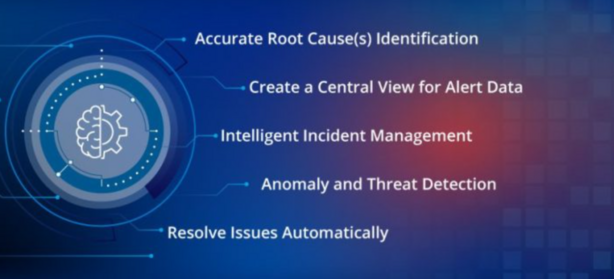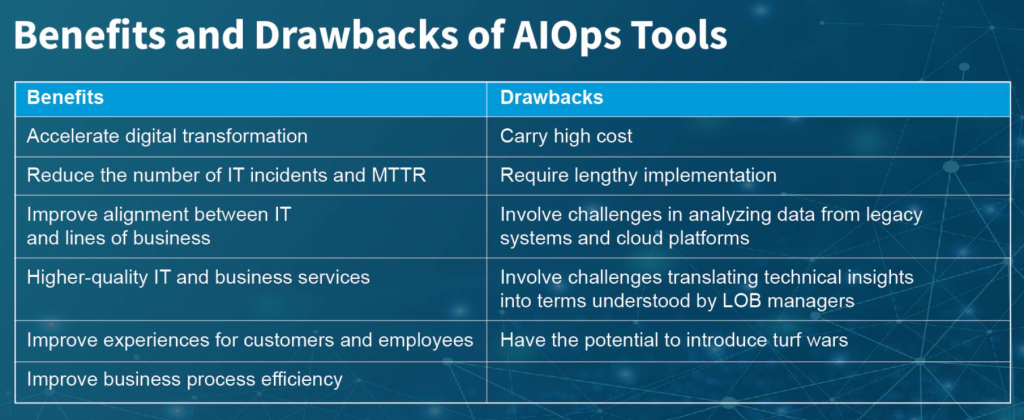Upgrade & Secure Your Future with DevOps, SRE, DevSecOps, MLOps!
We spend hours scrolling social media and waste money on things we forget, but won’t spend 30 minutes a day earning certifications that can change our lives.
Master in DevOps, SRE, DevSecOps & MLOps by DevOps School!
Learn from Guru Rajesh Kumar and double your salary in just one year.

AIOps stands for Artificial Intelligence for IT Operations. It is a discipline that uses artificial intelligence (AI) and machine learning (ML) to automate IT operations tasks, such as anomaly detection, root cause analysis, and incident response.AIOps can be used to improve a wide range of IT operations activities, including:
- Anomaly detection: AIOps can be used to identify anomalies in IT data, such as spikes in CPU usage or memory utilization. This can help to identify potential problems before they cause outages or performance degradation.
- Root cause analysis: AIOps can be used to identify the root cause of problems. This can help to speed up the resolution of incidents and prevent them from happening again.
- Incident response: AIOps can be used to automate the response to incidents. This can help to reduce the time it takes to resolve incidents and minimize the impact on users.
- Proactive monitoring: AIOps can be used to proactively monitor IT systems for potential problems. This can help to prevent outages and performance degradation before they occur.
- Resource optimization: AIOps can be used to optimize the use of IT resources. This can help to reduce costs and improve performance.

Here are some of the benefits of AIOps:
- Improved efficiency: AIOps can help to improve the efficiency of IT operations by automating tasks, such as anomaly detection and root cause analysis. This can free up IT staff to focus on more strategic initiatives.
- Reduced costs: AIOps can help to reduce costs by identifying and eliminating waste. For example, AIOps can be used to optimize the use of IT resources, such as servers and storage.
- Improved performance: AIOps can help to improve the performance of IT systems by identifying and resolving problems early. This can help to prevent outages and performance degradation.
- Improved decision-making: AIOps can help to improve decision-making by providing insights into IT operations data. This can help IT leaders to make better decisions about resource allocation, capacity planning, and incident response.
- Increased visibility: AIOps can help to provide IT teams with a single view of their IT environment. This can help them to identify problems and opportunities more quickly.
- Reduced risk: AIOps can help to reduce the risk of outages and performance degradation by identifying and resolving problems early.
- Improved customer satisfaction: AIOps can help to improve customer satisfaction by reducing the number of outages and performance degradation events.

AIOps is a powerful tool that can help organizations improve their IT operations. However, it is important to note that AIOps is not a silver bullet. It is still a relatively new technology, and there are challenges associated with its implementation.Some of the challenges of AIOps include:
- Data quality: The quality of the data used by AIOps solutions is critical to their success. If the data is not accurate or complete, the models built by AIOps solutions will be inaccurate.
- Complexity: AIOps solutions can be complex to implement and manage. This is because they typically involve a lot of different data sources, algorithms, and models.
- Security and privacy: AIOps solutions can collect a lot of sensitive data about IT systems and operations. This data needs to be protected from unauthorized access and disclosure.
AIOps (Artificial Intelligence for IT Operations) offers a range of benefits that contribute to improving the efficiency, reliability, and effectiveness of IT operations within an organization. Here are some key benefits of implementing AIOps:
- Early Incident Detection and Prevention:
- AIOps can identify anomalies and deviations from normal behavior in real-time. This enables early detection of potential incidents before they escalate into major problems or service disruptions.
- By predicting issues before they occur, AIOps helps IT teams take proactive measures to prevent downtime and improve system reliability.
- Faster Incident Resolution:
- AIOps assists IT teams in identifying the root causes of incidents more quickly and accurately by analyzing vast amounts of data and correlating events across the IT landscape.
- Faster resolution means reduced downtime and improved user experience, leading to higher customer satisfaction.
- Automated Remediation:
- AIOps can automate the resolution of known and routine incidents. This reduces the manual effort required to address common issues and allows IT personnel to focus on more strategic tasks.
- Optimized Resource Utilization:
- AIOps provides insights into resource utilization patterns, helping organizations optimize the allocation of computing resources, storage, and network bandwidth.
- This leads to cost savings, improved performance, and efficient capacity planning.
- Improved Operational Efficiency:
- By automating repetitive tasks, AIOps frees up IT staff from manual operations, enabling them to work on higher-value tasks such as innovation, strategic planning, and process improvement.
- Enhanced Decision-Making:
- AIOps provides data-driven insights and recommendations that assist IT and business teams in making informed decisions related to operations, performance, and resource management.
- Scalability and Complexity Management:
- In modern complex IT environments, AIOps can handle the massive volume of data generated by various systems and applications, making it easier to manage scalability and complexity.
- Real-time Monitoring and Visibility:
- AIOps provides real-time visibility into the health and performance of IT systems, applications, and services. This enables faster response to emerging issues and reduces the impact of potential problems.
- Alignment with Business Goals:
- By identifying the impact of IT incidents on business processes, AIOps helps align IT operations with business objectives, ensuring that technology supports overall business success.
- Continuous Learning and Improvement:
- AIOps systems learn from historical data and feedback, continuously improving their accuracy in identifying patterns and predicting outcomes.
- Adaptation to Dynamic Environments:
- AIOps is well-suited for dynamic and cloud-based environments where traditional monitoring methods may be insufficient due to the complexity and speed of changes.
- Regulatory Compliance and Security:
- AIOps can contribute to regulatory compliance by ensuring systems are properly monitored and incidents are managed effectively. Additionally, it supports security practices by identifying security-related anomalies and threats.
